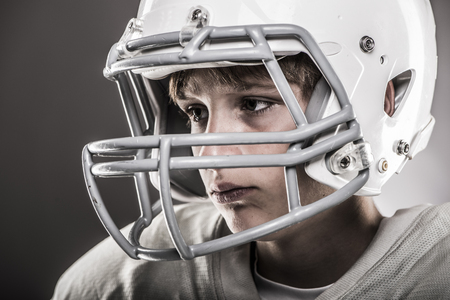

Decline in Youth Football Attributed to Risk of Head Injury
Parents must consider the risk of head injury when they sign their children up to play for sports. Every year thousands of children play in youth football leagues, many with dreams to play in college or the NFL. The last couple of years, however, have brought a lot of bad news about head injuries for football. U.S. emergency departments treat an estimated 135,000 children ages 5 to 18 for sports-related brain injuries every year. Most of these injuries are concussions, and the child has a full recovery but when a child experiences multiple concussions it is not known how the brain will be affected long term. It is possible that even a set of mild concussions can put a person at risk for early onset dementia, Parkinson’s disease and other neurological disorders that require neurosurgery.
The numbers are significant; 25,000 kids stopped playing the sport between 2010 and 2012, which is a 9.5% decline in participation. Many medical experts believe that the number one reason for the decline in numbers is due to parental concerns over head injuries.
Pop Warner, the largest youth football organization in the United States is taking action to curb the risk of head injury among its players. The first step taken was to cut back significantly on tackling during practice. They have also partnered with the NFL and USA Football to endorse the “Heads Up” program which is designed to teach proper tackling techniques to children. This is a tactic long taken by the youth hockey programs in Canada. The idea is that when tackling skills are taught correctly, the sport can be played as its meant to be without as much risk for injury.
Some experts believe that Pop Warner and USA Football are in denial about the real reasons for the decline in youth participation. Officially, these organizations blame participation decline on a downturn in the economy and on athletes being pressured to specialize in a single sport. Football, however, has become a year round sport so it seems unlikely that economic factors are really playing a role in the decline. It seems clear to most that the horrific news coverage about Chronic Traumatic Encephalopathy (CTE), a brain disease caused by multiple blows to the head like those received in long-term football play is more than likely the cause.
It is noteworthy and relevant that the NFL recently settled a class-action lawsuit for $765 million to compensate over 4,500 victims of head injuries from concussions incurred while playing football. Although the plaintiffs argued that the NFL had concealed a link between playing football and brain damage, the NFL refused to admit misconduct. One could argue, however, that by settling for millions of dollars they were admitting fault without saying so.
There are hall of fame football players such as Lem Barney who have publicly stated that they would choose not to have played football if they could go back. The two recent deaths of Mike Webster and Seau were attributed to brain injuries caused by football. It is hard for anyone, especially parents caring for their children, to ignore these facts when deciding on which sport to let your child play.
If your child incurred a
head injury while playing football you may be able to claim damages in a personal injury case. The head injury attorneys at Tario & Associates, P.S. have the expertise to help you with your case and fight for the compensation you deserve. Call us today for a consultation!
Read More

Common Causes of Head Injury
Two million Americans will suffer a head injury this year; most will be minor but over a half a million of these accidents will require hospitalization.
Although it should go without saying that a head injury be taken seriously, many people consider head injuries as an acceptable risk while playing sports. In a worst case scenario, a head injury can bring on permanent disability, mental impairment or even death.
Definition: A head injury, also called a traumatic brain injury, head trauma, or concussion, is any trauma to the head that leads to injury of the scalp, skull, or brain. A head injury is either closed or penetrating. A closed head injury is one where the head sustains a blow from an object. A penetrating head injury is one where the object strikes the head, breaks through the skull and enters the brain.
The most common type of head injury is a concussion in which the brain is jarred inside the head. There are an estimated 1.6 million to 3.8 million sports-related concussions a year in the United States. A concussion temporarily alters ones mental state and multiple concussions can have long-term or permanent effects on mental cognition. Keep in mind that you do not necessarily need to be knocked in the head or lose consciousness to experience a concussion.
Permanent brain damage can be caused with a serious concussion; examples include when bleeding occurs inside the brain (intracranial hematoma), or when nerve cells are damaged (a diffuse axonal injury), or an infection is caused by blunt trauma (subdural empyema). The severity of the injury can determine the symptoms endured which can include paralysis, coma, seizures, personality changes, hearing and vision loss, loss of taste and smell and cognitive or learning disabilities. Damage may be immediately obvious or take hours or days to crop up.
Other traumatic brain injuries include contusions which are a bruise on the brain causing swelling and a hematoma which is bleeding in the brain that collects and forms a clot. A skull fracture is also considered a head injury; it is particularly dangerous when pieces of bone cut into the brain and cause bleeding.
If you or a loved one experience bleeding, an altered state of consciousness, convulsions, severe headache, skull fracture or scalp wound, blurred vision or pupil changes, a stiff neck, slurred speech or fluid draining from your nose, mouth or ears you should seek medical attention immediately. A delay in the diagnosis of a head injury could cause further damage or death.
Signs of a Head Injury
- Double or blurred vision
- Confusion
- Dizziness or balance issues
- Depression
- Feeling cloudy, groggy or sluggish
- An enduring headache
- Memory loss
- Nausea
- Sensitivity to light or noise
- Trouble sleeping
- Trouble concentrating or remembering
Causes of Head Injury
Apart from sports accidents, common causes of head injuries are car accidents, work-site accidents, falls at home or work, and industrial accidents.
Sports are the biggest cause of head injuries. The top 5 most offending sports in the United States include:
1. Cycling
2. Football
3. Basketball
4. Baseball and softball
5. Water sports such as diving and water skiing
Whether you were injured at work, home or on the sports field, many head injury accidents are actually caused by the reckless or negligent behavior of others and you are entitled to be compensated for your suffering and losses. With decades of experience, the head injury attorneys at Tario & Associates, P.S. will help you wade through your head injury case and fight for the compensation you deserve. Call us today!
Read More

Should I seek a personal injury attorney for a brain injury?
If you have been involved in an accident that has resulted in a brain injury, seeking a consultation with a personal injury attorney who specializes in this area can help you recover financial damages as a result of the injury, as well as ongoing medical treatment, lost wages, among other losses. Regardless of the cause of the injury, even a minor brain injury can result in serious, lifelong mental, physical and emotional impairments and it is important to understand what you might be facing in the future.
Even “simple” automobile accidents can result in costly medical bills. When injury to the brain occurs, treatment and recovery can result in extensive costs that exceed well beyond initial medical expenses. Frequently, recovery from brain injury involves the need for expensive and extensive physical rehabilitation, psychological counseling and various support services, including those needed by affected family members.
When working with a personal injury attorney who specializes in brain injury accidents, it is important the attorney have access to exceptionally well-qalified experts who can quantitatively assess and evaluate the injuried party and the potential impact of such injury.
Time is always of the essence when dealing with an injury. While waiting to meet with an attorney, be certain to begin collecting and charting any information pertaining to the accident, and what you were doing in the time leading up to the accident – no bit of information is too minor – include everything so the attorney can be better informed to assist you.
Call Tario & Associates today for a free brain injury accident consulation.
Read More
